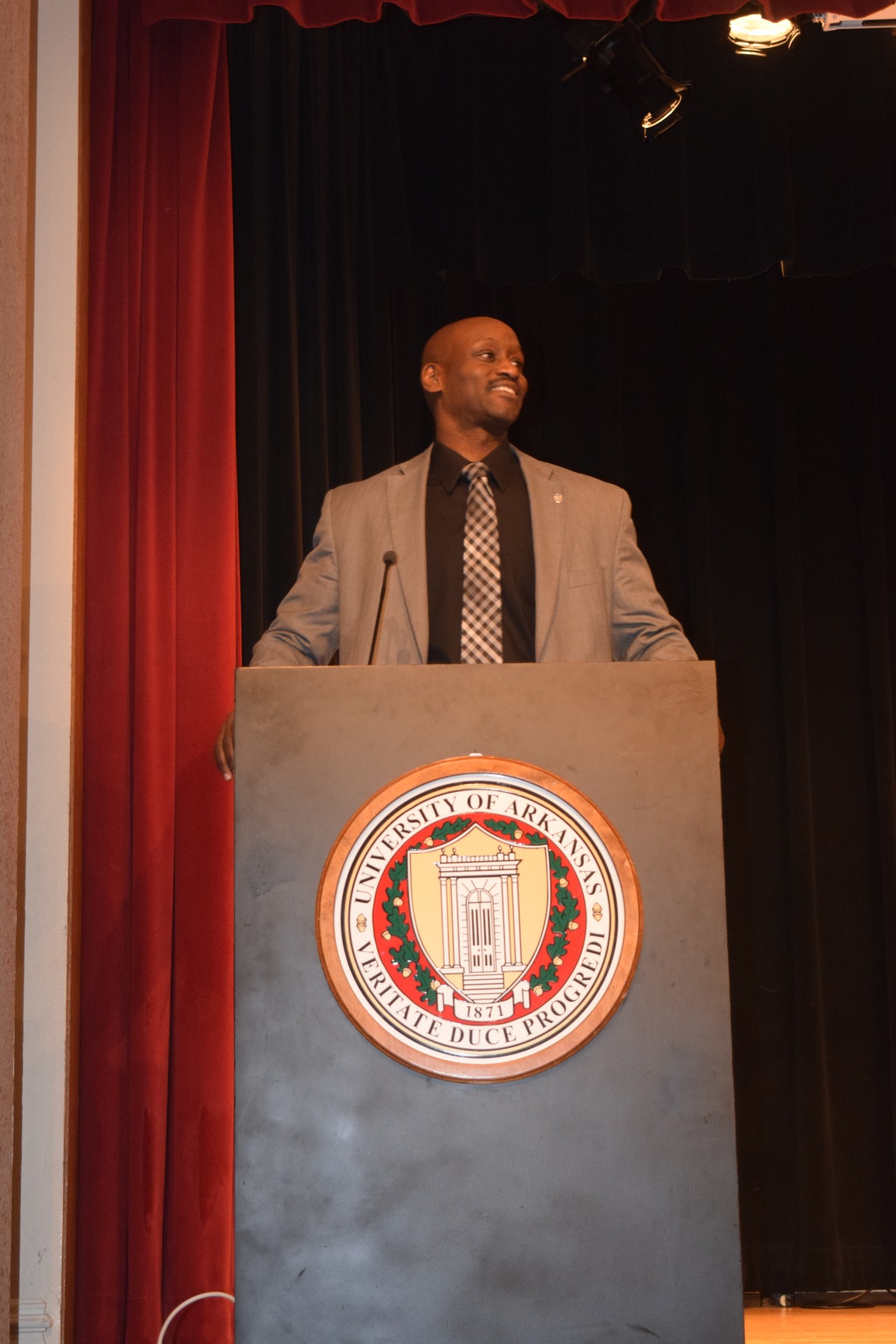Student poet Kristen Smith confidently and clearly delivered these lines to the audience of students and community members at the Martin Luther King, Jr., Vigil on January 18, 2016. The vigil, hosted by the University of Arkansas Associated Student Government, ASG, strove to honor the legacy King left behind and continue the conversation and civil movement he started.
The vigil included remarks from Interim Vice Provost for Student Affairs and Vice Chancellor for Diversity and Community Charles Robinson, Northwest Arkansas Dream Keepers President Trey Smith, and U of A graduate student Joseph Daniels, with performances by Kristen Smith and the U of A Inspirational Choir.
The annual event is about displaying the talent of U of A students and honoring King’s legacy, Morgan Farmer, vice president of Associated Student Government, said.
“The MLK Day Vigil really highlights Martin Luther King, Jr.’s life and his legacy,” Farmer said. “We want to commend those traits and exemplifies what he did during his lifetime and showcase that to the students.”
Charles Robinson, who gave the welcome, began with one guiding principle King lived by – holding hope close.
“When I think about Dr. King, one of the things that’s consistently revealed in his writing is that he always embraced the notion of hope,” Robinson said. “It didn’t matter whether he was having a dream or if he was going, ascending to the mountain top, or he was watching as truth crushed the earth and rose again, Dr. King embraced the notion of hope.”
Robinson said that if you can find hope, it will never leave you.
“Hope always makes you feel better and enables you to feel the warmth of the greatness of life. Hope instills you with the sense that you need to do something. Hope doesn’t just come in to make you feel better, it makes you do something. It energizes you,” Robinson said. “Hope is always with you. It’s always near by. The only time you can’t feel or see hope, is when you refuse to feel it or when you refuse to see it.”
Trey Smith, president of the Northwest Arkansas Dream Keepers, gave opening remarks about personal experiences that have lead him to actively pursue and promote diversity.
“If I could sum it up in one world, Dr. King’s dream would be diversity,” Smith said. “And see diversity, it’s a tricky word. It’s easy to think we’ve achieved it. We think because we’ve elected a black president that equals diversity. We feel like because we have multi-lingual warning labels on packages that we have diversity; that because we have blacks kids in the same classes with white kids in the same classes as Hispanic kids in the same classes as Asian kids, then we’ve achieved diversity. But in reality, that’s more circumstantial.”
Smith said diversity must be actively pursued and cannot truly be achieved unless society as a whole is constantly moving toward it together.
“I think diversity is an active thing. You have to actively work to acknowledge the differences that your brothers and sisters bring to this nation,” Smith said. “We have to actively work to embrace our brothers and sisters. We have to actively work to appreciate the differences that they bring and acknowledge that it is those differences that make this nation and this world a beautiful and unique place. We have to actively work against the socialization that tells us that we’ve already made it because that is the danger.”
The socialization of violence and discrimination in America is keeping Americans from truly engaging in issues, Smith said.
“We can hear of some people getting shot in the streets for no other reason than the color of their ski and it stops affecting us. We hear about people being afraid to go jogging at night because of their gender, and it stops affecting us. We can hear about people getting beaten up in alleyways because of their sexual orientation, and it stops affecting us. We hear about people going into their place of worship to come out and be greeted by guns, and it stops affecting us because we told ourselves if its not happening to us, it’s not relevant,” Smith said. “When we stop telling ourselves that we have somehow fallen magically into a post-racial America and then we don’t have to try anymore then, and only then, will Dr. King’s dream become to come true.”
Joseph Daniels, graduate student at the U of A, gave the keynote address. The focus of his message – agape love.
Daniels paid homage to the black students who first applied to institutions of higher education and gave him the “shoulders to stand on” to achieve his own dreams: Autherine Juanita Lucy of the University of Alabama; James Howard Meredith of the University of Mississippi; and Silas Herbert Hunt of the University of Arkansas.
Daniels said now is the time for a movement of agape love.
“Love that is redemptive … That love that seeks to preserve and create community, that goes to any lengths to restore community – agape love.”
Now is the time to start loving thy neighbor, Daniels said.
“No longer can we continue in the mindset that time can heal all our love problems. We can’t wait to love each other, we can’t wait to love our neighbors. We can’t wait to love our classmates, we can’t wait to love our coworkers. We can’t wait to love our enemies. We can’t wait to love our countrymen,” Daniels said. “We can’t wait because this 2016 presidency seems to be saturated with hate. Why can’t we wait? Because there is a multitude of homeless people across our community, cold, hungry, and begging for someone to love them. Why can’t we wait? Because there are too many children on free or reduced lunch that might only receive that one meal that day. Why can’t we wait? Because racist bigots need love for them to be free from a system that’s engulfed in hatred and violence.”
“If we love like God loves us, then we truly will be one nation under God, indivisible with liberty and justice for all. When we love like this, we will get to that one day. We will get to the mountain top. We will join Dr. King in the promised land and tell him ourselves – Martin your dream has been revealed that dream that one day is today.”









